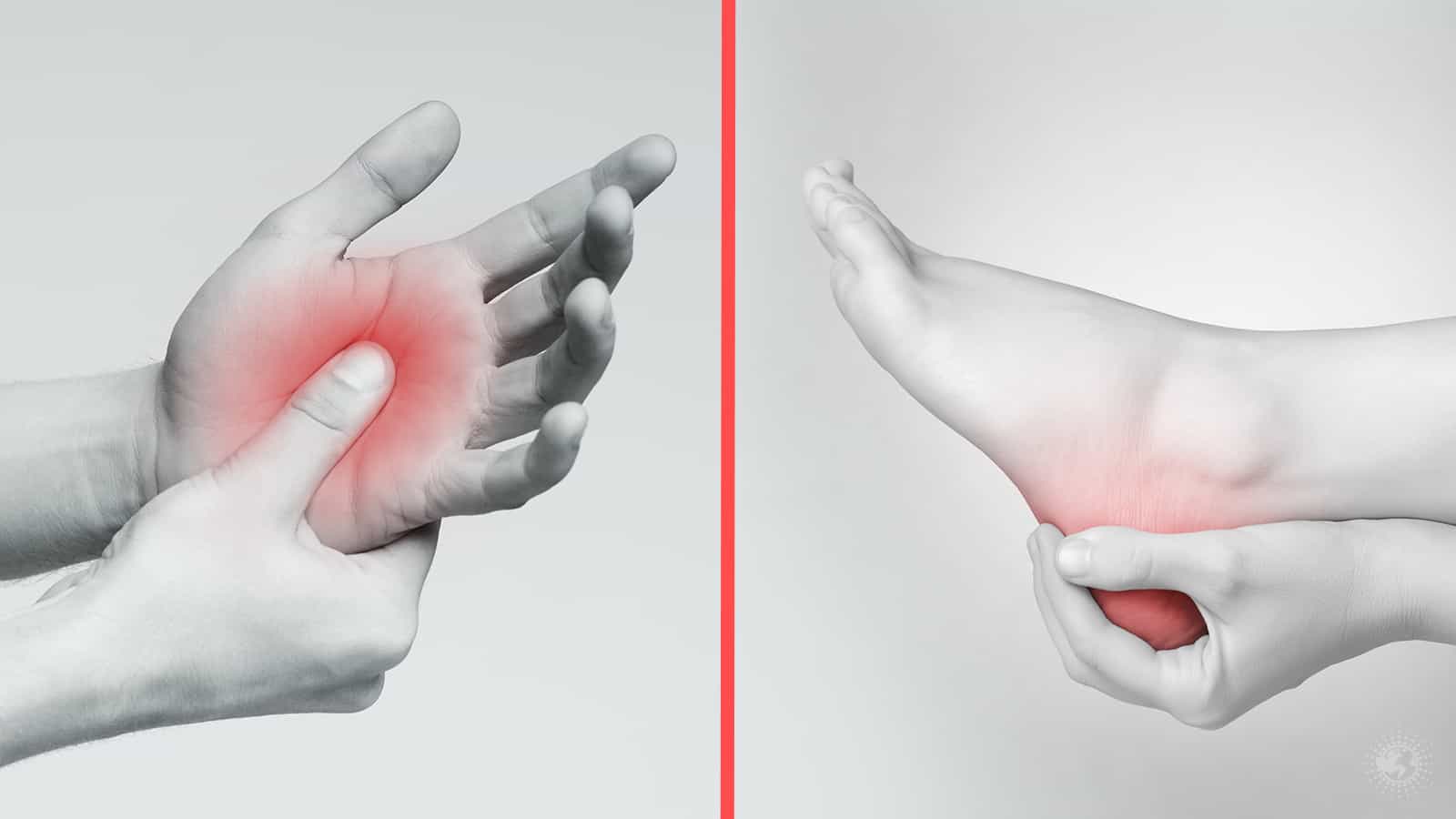Neuropathy occurs due to damage of the nerves outside the brain and spinal cord, causing weakness and pain in the hands, feet, and other parts of the body. Also called peripheral neuropathy, this condition disrupts the normal functioning of the nerves, causing them to send pain signals at inappropriate times. For instance, they might send messages of pain when you’re not experiencing it, or fail to send pain signals when something is hurting you.
The peripheral nervous system connects nerves in your spinal cord and brain to the rest of your body, including your:
- arms
- hands
- feet
- legs
- internal organs
- mouth
- face
Your nervous system exists to send signals back to your mind, letting it know when danger or pain is imminent. Usually, a disruption of the nervous system occurs due to:
- an injury
- infection
- an inherited disorder
- systemic illness
While damage to the nervous system does cause discomfort, the good news is it’s highly treatable. Doctors will ask you questions about your health, such as previous injuries or infections, to determine the best course of treatment. If you have a severe underlying condition, your doctor will want to know this as it could explain the cause of the nerve damage.
Different types of neuropathy
Contents
First off, you have three different types of peripheral nerves in the body: sensory nerves, which send signals to your skin, motor nerves, which connect to the muscles, and autonomic nerves, sending messages to your internal organs. Neuropathy may affect just one nerve group or all three, and each type will have different symptoms and treatment schedules. In total, science identifies over one hundred different kinds of peripheral neuropathy. These are classified by the kind of damage to the nerves involved; mononeuropathy occurs when damage exists in only one nerve, and polyneuropathies occur when multiple nerves have malfunctioned.
Common symptoms of neuropathy
- tingling sensation most commonly felt in the hands or feet
- a feeling of compression around the hands or feet
- sharp, stabbing pains
- numbness in extremities
- a sense of weakness or heavy feeling in the hands or feet
- feels like your arms or legs get locked in place
- a buzzing or shocking sensation
- dropping things often
- thinning of skin
- low blood pressure
- erectile dysfunction in men
- constipation
- digestive problems
- diarrhea
- excessive sweating
Having these symptoms doesn’t necessarily indicate nerve damage, but make sure to tell your doctor about them so they can make an accurate assessment.
Here are five leading causes of neuropathy:
While a family history of nerve damage disorders increases the likelihood of developing them, other factors can contribute to this condition. Below, we’ll go over some of the leading causes of neuropathy.
-
Generalized diseases
Diseases such as diabetes have been known to increase the likelihood of developing nerve damage since high blood glucose levels and high triglycerides can disrupt the nervous system. Neuropathy development increases dramatically for people who:
- have diabetes
- are overweight or obese
- have high blood pressure
- are older than 40
According to statistics shared by the University of Chicago’s Center for Peripheral Neuropathy (UCCPN), around 60% of those with diabetes suffer from some type of nerve damage. This damage occurs due to high blood sugar levels most commonly, although high levels of fat in the blood may contribute as well.
Nerve damage might also occur resulting from the following chronic diseases:
- kidney disorders which cause toxins to accumulate in the body
- hypothyroidism, which can lead to fluid retention and pressure surrounding the nerves
- chronic inflammation can spread to the nerves and cause damage to the connective tissues
- deficiencies of B and E vitamins specifically, which help with proper nerve functioning
-
Injuries
Most commonly, nerve damage occurs because of some type of physical harm. This may include car accidents, bone fractures, concussions, or falls. Sedentary lifestyles may also cause nerve damage if you sit in one position for too long. Working for long hours on the computer may lead to nerve damage as well due to leaving the wrist in one spot the majority of the time. Called carpal tunnel syndrome, this condition affects more than 3 million Americans each year and is a common type of neuropathy.
-
Alcohol and other toxins
Alcohol can damage the nerves over time because of high levels of toxicity in the body. Other toxins that can cause nerve problems to include glue, pesticides, and solvents with high levels of exposure. Working in environments with heavy metals without taking proper precautions can cause nerve issues also.
-
Infections and autoimmune disorders
Some viruses and bacteria target the nervous system specifically, such as herpes simplex, varicella-zoster virus, responsible for chickenpox and shingles, and Epstein-Barr virus, which damages the sensory nerves and causes shooting pain. Bacterial infections such as Lyme disease may also cause nerve damage and discomfort if left untreated. People who have HIV or AIDS may experience peripheral neuropathy, as well.
In addition, autoimmune disorders like arthritis and lupus can affect the nerves because of chronic inflammation and tissue damage throughout the body. Pressure due to swelling may also cause nerve pain in the legs and arms.
-
Medications
Certain medications, such as the following, can also cause nerve damage in some cases:
- anticonvulsants which are taken to treat seizures
- drugs to fight bacterial infections
- some blood pressure medications
- cancer medications
Research from The Journal of Family Practice also indicates that statins, a type of drug used to prevent cardiovascular disease and lower cholesterol, may cause damage to the nerves and increase the risk of developing nerve disorders.
Diagnosis of nerve disorders
Your doctor will first give you a physical exam and get insight into your medical history. If this doesn’t help them determine the problem, they will perform other tests such as:
- Blood tests indicate blood sugar levels and can determine if you may have a thyroid disorder.
- Your doctor might also wish to do a CT scan or MRI to see if anything is pressing on your nerves, like a tumor.
- A nerve biopsy, where you will undergo a minor surgery so the doctor can remove a small portion of your nerves to inspect it under a microscope.
- Electromyography, which involves the doctor placing a small needle into your muscle and asking you to move it gently, can show problems with how your nerve signals move to your muscles. The needle will confirm the amount of electricity running through your tissue. While it may sound painful, this procedure only causes mild soreness for a few days.
- Finally, your doctor might want to do a nerve conduction study, which involves placing electrodes on your skin, which pulse tiny amounts of electricity through your nerves. This shows whether your nerves are transmitting signals properly.
Natural ways to treat neuropathy
The cause of neuropathy will determine your course of treatment. For example, if diabetes is causing it, you will likely need medication or lifestyle changes to control blood sugar spikes. If a vitamin deficiency is a cause, then you’ll need to supplement with vitamins or start eating more vitamin-rich foods. Sometimes a combination of medication and lifestyle changes is necessary.
However, since we want to discuss natural treatments in this article, we will skip the recommended medications often prescribed for neuropathy.
Transcutaneous electronic nerve stimulation (TENS)
Transcutaneous electronic nerve stimulation (TENS) may not work for everyone, but it doesn’t involve any drugs and is relatively painless. With TENS treatment, your doctor will place electrodes on the skin, which sends tiny amounts of electricity into the body. The goal of this therapy is to stop the nerves from sending pain signals to the brain.
Ergonomic casts or splints
Your doctor may recommend this type of cast or splint if the nerve problem occurs in your feet, legs, arms, or hands. These casts provide support for the area of the body where you’re experiencing pain or discomfort, for example, in your wrists if you suffer from carpal tunnel syndrome. Many people who work on the computer for long hours wear a brace while they sleep, which keeps the wrists in the correct position.
Home treatments
Natural remedies such as the following can significantly help ease the pain associated with nerve problems:
Preventing and lowering the risks of developing this condition
While a family predisposition can increase your risk of developing neuropathy, you can still take precautions by:
- avoiding alcohol or drinking it only in moderation
- quitting smoking if you have already started
- eating a balanced diet
- getting regular exercise
- managing stress
Final thoughts on the causes of neuropathy and natural treatments for it
If your nerve problems occur due to an underlying condition, then your doctor will attempt to treat that condition to stop the nerve pain. However, if the neuropathy occurs for other reasons, you can still manage your symptoms effectively through lifestyle changes and/or medication. Your physician will help you decide the best course of action as well as natural home remedies to manage your symptoms.
Source: 5 Causes of Neuropathy (And How to Help It Naturally)- powerofpositivity.com

